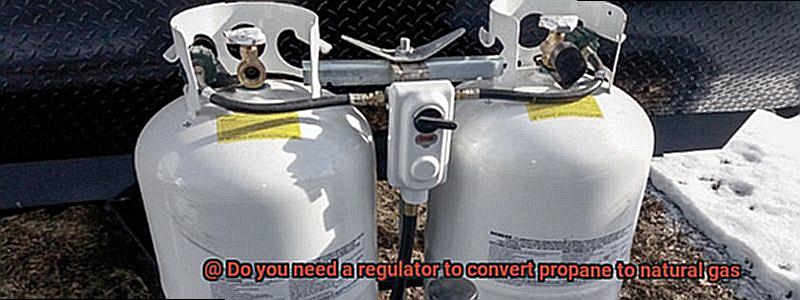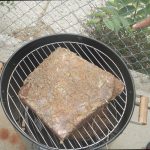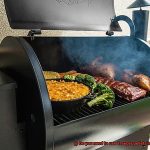Are you a fan of mouth-watering barbeques or cooking up a storm on your trusty gas stove?
If so, it’s crucial to know the ins and outs of propane and natural gas. While they’re both popular fuels for heating and cooking, there are some significant differences between the two.
For instance, propane is usually delivered at a higher pressure than natural gas, which means that it requires a regulator to convert it to a lower pressure. But what happens when you want to switch from propane to natural gas?
Do you still need a regulator? In this blog post, we’ll dive into the question – do you need a regulator to convert propane to natural gas?
We’ll explore how propane and natural gas are delivered to your home, their distinct characteristics, and the vital role that regulators play in converting one fuel type to another. Additionally, we’ll discuss the perks of switching from propane to natural gas and how using a regulator can help you accomplish this safely and efficiently.
So whether you’re an experienced grill master or a novice home cook, keep reading for valuable insights on why using a regulator is crucial when converting from propane to natural gas.
Contents
The Difference Between Propane and Natural Gas
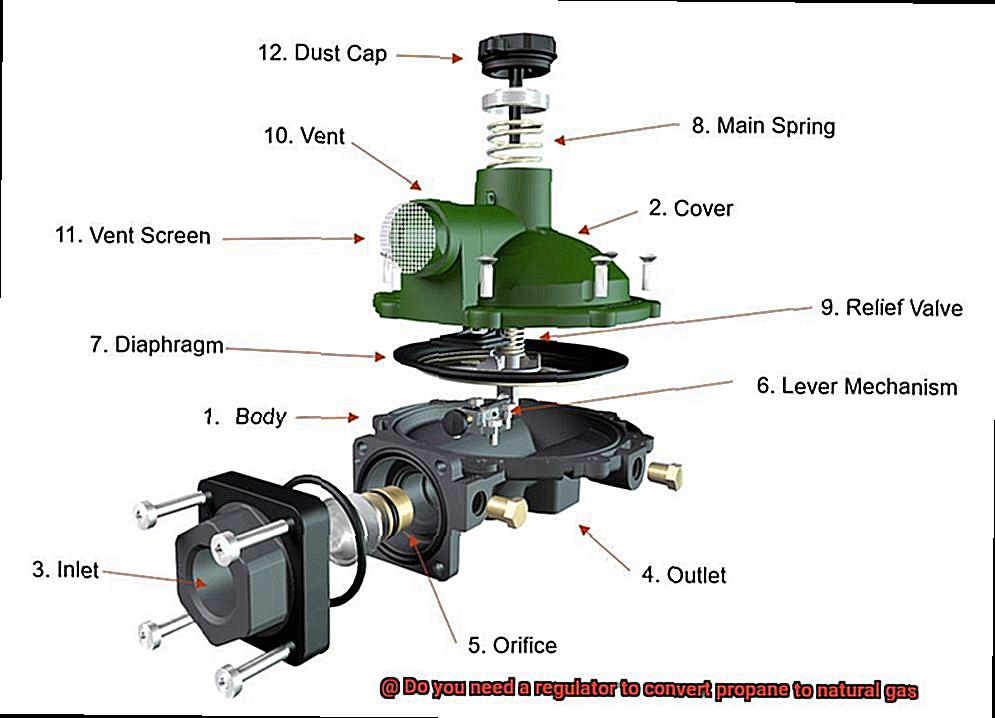
While both fuels are popular choices for grilling and powering appliances, there are some significant differences to be aware of before you make the transition.
Firstly, propane is a liquefied petroleum gas that consists of propane molecules, while natural gas is a fossil fuel primarily composed of methane. This difference in composition means that propane has a higher energy content per unit volume than natural gas, making it more efficient for certain applications. Additionally, propane is stored in tanks and can be easily transported to where it’s needed, while natural gas is supplied through pipelines and only accessible in areas where pipelines exist.
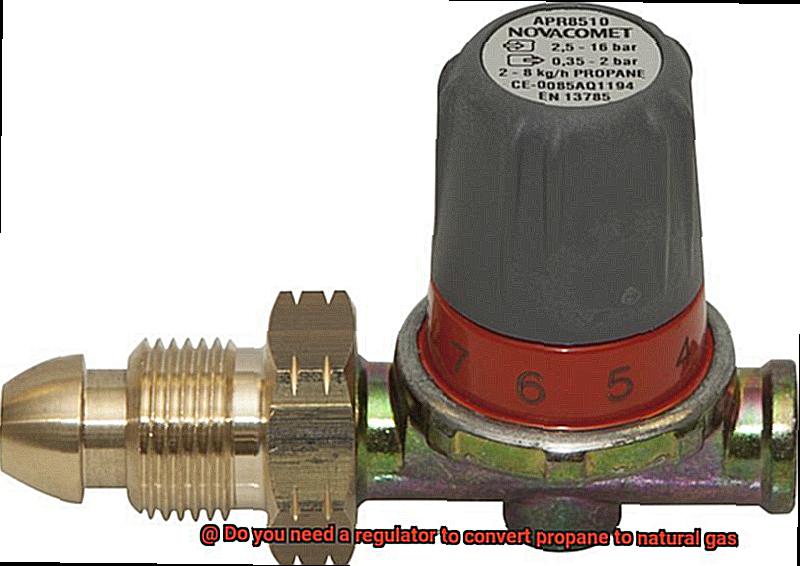
When it comes to grilling, portability and heat output are key factors to consider. Propane is often the preferred choice due to its higher heat output and portability, making it ideal for outdoor cooking. However, if you’re looking to convert your grill from propane to natural gas, you’ll need the right equipment and safety measures in place.
To make the switch, you’ll need to install a natural gas line and a regulator specifically designed for use with natural gas. It’s important to note that using the wrong type of regulator can be dangerous as propane and natural gas have different pressure requirements. Attempting to use a propane regulator with natural gas or vice versa can lead to leaks, fires or explosions.
When choosing a conversion kit, ensure that you have the right type of regulator for your specific grill. Some conversion kits may already include a regulator, but others may require you to purchase one separately. To guarantee a safe and successful conversion, it’s recommended that you seek professional installation by a licensed technician.
Why You Need a Regulator for Conversion
Before you make the transition, it’s important to understand the role of one crucial component: the regulator. Without a regulator, there could be serious safety concerns when converting propane to natural gas.
Why is a regulator necessary for conversion? Firstly, propane and natural gas operate at different pressure levels. Without a regulator, natural gas would flow into the appliance at dangerously high pressure levels, which could lead to gas leaks, fires or even explosions. A regulator reduces the pressure of the gas from the high-pressure source to a lower pressure suitable for use in grills and other appliances. This ensures that the gas pressure stays within safe limits while also providing enough gas flow to power the appliance.
But that’s not all. Propane and natural gas have different chemical properties too. Propane has a higher energy content than natural gas, meaning that more propane is required to produce the same amount of heat as natural gas. A regulator helps to adjust the gas flow so that the appliance receives the correct amount of gas needed for optimal performance.
Using a regulator is often required by local codes and regulations as well. These codes are put in place to ensure that appliances are installed and operated safely. So, if you’re considering converting your propane grill to natural gas, don’t forget about the regulator. It’s an essential component for safe, efficient operation of your appliance.
Types of Regulators Available
Converting your propane grill to natural gas is a smart move if you’re looking to reduce fuel costs and your carbon footprint. However, it’s crucial to understand the various types of regulators available to ensure safe and efficient operation.
The single-stage regulator is the most common type of regulator and is ideal for most residential applications. It is designed to reduce high-pressure gas from the source to a lower pressure suitable for grilling. The single-stage regulator is a simple and inexpensive option that will work well for most homeowners.
The two-stage regulator provides a more consistent and reliable gas flow than the single-stage regulator. It operates in two stages, with the first stage reducing the gas pressure from the high-pressure source to an intermediate pressure, and the second stage further reducing it to a lower pressure suitable for use in grilling. Although more complex and costly than the single-stage regulator, it offers better performance and safety.
If you want greater control over your cooking temperature, an adjustable regulator may be the way to go. This type of regulator allows users to adjust the gas pressure according to their specific needs. However, it requires more skill and knowledge to operate than other types of regulators.
Lastly, there’s the high-pressure regulator. This type of regulator is designed for use with high-pressure sources such as tanks or cylinders but is not suitable for use with natural gas because it cannot regulate the lower pressure required for grilling.
When selecting a regulator, it’s essential to choose one that is specifically designed for converting propane to natural gas. Using an incompatible regulator can result in unsafe operation, equipment damage, or even fire or explosion.
Factors to Consider When Choosing a Regulator
If you’re thinking about converting your propane grill to natural gas, you need to choose the right regulator. With so many options available on the market, it can be overwhelming to know which one is right for your needs. As an expert in this area, I’ve compiled a list of factors to consider when choosing a regulator for converting propane to natural gas.
First and foremost, you should consider the type of gas you are dealing with. Propane and natural gas have different properties and require different types of regulators. Propane has a higher pressure than natural gas and requires a high-pressure regulator, while natural gas has a lower pressure and requires a low-pressure regulator.
Another important consideration is the type of appliance you are using. Different appliances have different pressure requirements, and you need to choose a regulator that is compatible with your appliance. For instance, a grill may require a different type of regulator than a stove or a water heater.
The flow rate of gas is also crucial when choosing a regulator. You need to pick a regulator that can handle the flow rate required by your appliance. The flow rate determines how much gas can pass through the regulator at any given time.
Regulators come in different sizes and styles, so you must choose one that is compatible with your installation requirements. Some regulators require special installation techniques, while others can be installed using standard techniques.
Finally, safety should always be a top priority when dealing with gas appliances. Make sure the regulator you choose has safety features such as automatic shut-off valves or pressure relief valves. You don’t want to compromise on safety when it comes to your family’s well-being.
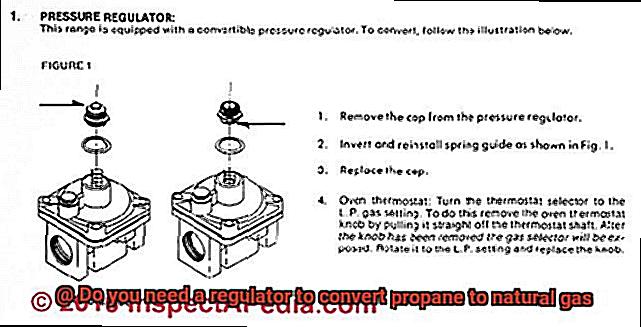
How to Install the Regulator Properly
Converting your propane grill to natural gas is a smart move that can save you money and let you enjoy grilling all year round. However, it’s crucial to install the regulator correctly to ensure safe and efficient operation of your grill. Here are five essential steps to help you install the regulator properly when converting from propane to natural gas.
Choose the right type of regulator
It’s vital to choose a regulator that can handle the higher pressure of propane and the lower pressure of natural gas. The regulator must be compatible with your grill’s size and type of hose.
Turn off the gas supply
Before you start installing the regulator, turn off the gas supply and disconnect any hoses or connections from the grill or appliance.
Remove the old regulator
If you have an old propane regulator, remove it carefully before attaching the new natural gas regulator.
Install the new regulator
Attach the new natural gas regulator to the valve or pipe where the old propane regulator was connected. Make sure all connections are tight and secure using a wrench or pliers if necessary. It’s also recommended to use pipe thread sealant on all threaded connections to prevent leaks.
Test for leaks
After installation, test the regulator and connections for any gas leaks using a soapy water solution. Apply the solution to all connections and look for any bubbles indicating a leak. If any leaks are detected, tighten connections or replace damaged parts as needed.
Common Mistakes to Avoid During Installation
It’s a smart move for many reasons, but safety should be your number one priority during the installation process. My expertise in this field has led me to compile a list of common mistakes that you should avoid to ensure your safety.
Firstly, using the right tools is crucial. Using inappropriate equipment and tools can cause damage to the gas lines or lead to dangerous leaks. Therefore, it’s vital to use specific tools designed explicitly for this purpose.
Secondly, following the manufacturer’s instructions is non-negotiable. Each grill or appliance comes with its own set of instructions that must be followed precisely. Ignoring these instructions could result in improper installation and, ultimately, unsafe conditions.
Thirdly, failing to check for leaks can have devastating consequences. Before using your grill or appliance, it is critical to check for any leaks in the gas lines. A leak can cause a fire or explosion, which could be deadly. To avoid this, use a leak detector and inspect all connections thoroughly.
Lastly, not hiring a professional for installation is a common mistake that can have severe consequences. Gas appliances and grills require specialized knowledge and skills to install correctly. Hiring a professional guarantees that the installation is done safely and accurately, minimizing the risk of accidents or damage.
Benefits of Converting from Propane to Natural Gas
If so, it’s time to consider the numerous benefits of converting to natural gas. As an expert in this area, I can confidently tell you that making the switch can improve your life in many ways.
First and foremost, converting from propane to natural gas can save you a significant amount of money. Natural gas is considerably less expensive than propane, meaning that you’ll see a considerable reduction in your energy bills. Additionally, natural gas appliances tend to be more efficient than propane appliances, which can lead to even more cost savings over time. You won’t have to worry about breaking the bank just to keep your home running efficiently.
Convenience is another major perk of switching to natural gas. Propane requires regular refilling or replacing of tanks, which can be a real hassle and disrupt your daily routine. With natural gas, there’s no need to worry about running out of fuel or scheduling tank deliveries – it’s delivered directly to your home’s gas line whenever you need it. This means you can focus on other important things in your life rather than worrying about your energy source.
But perhaps the most compelling reason to convert from propane to natural gas is its environmental friendliness. Natural gas burns cleaner than propane, producing fewer emissions and contributing less to air pollution. Not only will you be doing your part to protect the environment, but you’ll also support American jobs by using a domestic resource rather than relying on foreign oil.
d2GljedOVaQ” >
Conclusion
In summary, switching from propane to natural gas requires more than just a simple fuel swap. It’s crucial to understand the differences between the two and use the appropriate equipment for safe and efficient operation. A regulator designed for natural gas is essential in reducing the pressure of high-pressure gas to a lower pressure suitable for grills and appliances.
When choosing a regulator, consider factors such as gas type, appliance type, and flow rate. Safety should always be top priority when dealing with gas appliances. But don’t let safety concerns discourage you from making the switch – converting to natural gas can offer cost savings, convenience, and environmental benefits.
By seeking professional installation by a licensed technician and using a compatible regulator, you can enjoy years of worry-free grilling or appliance use.

